第二届卡西欧杯日文翻译范文
卡西欧杯翻译竞赛历年赛题及答案
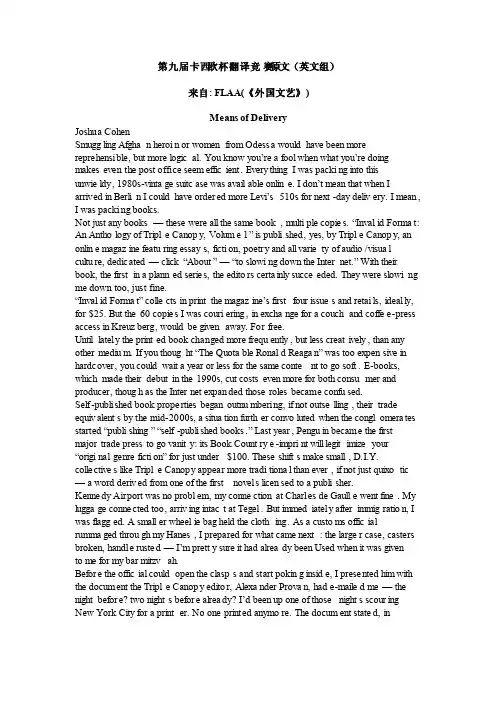
第九届卡西欧杯翻译竞赛原文(英文组)来自: FLAA(《外国文艺》)Meansof Delive ryJoshua CohenSmuggl ing Afghan heroin or womenfrom Odessa wouldhave been morerepreh ensib le, but more logica l. Youknowyou’reafoolwhenwhatyou’redoingmakeseven the post office seem effici ent. Everyt hingI was packin g into thisunwiel dy, 1980s-vintag e suitca se was availa ble online. Idon’tmeanthatwhenIarrive d in Berlin I couldhave ordere dmoreLevi’s510s for next-day delive ry. I mean, I was packin g books.Not just any books— thesewere all the same book, multip le copies. “Invali d Format: An Anthol ogy of Triple Canopy, Volume 1”ispublis hed, yes, by Triple Canopy, an online magazi ne featur ing essays, fictio n, poetry and all variet y of audio/visualcultur e, dedica ted — click“About”—“toslowin g down the Intern et.”Withtheirbook, the firstin a planne d series, the editor s certai nly succee ded. They were slowin g me down too, just fine.“Invali d Format”collec ts in printthe magazi ne’sfirstfour issues and retail s, ideall y, for $25. But the 60 copies I was courie ring, in exchan ge for a couchand coffee-pressaccess in Kreuzb erg, wouldbe givenaway. For free.Untillately the printe d book change d more freque ntly, but less creati vely, than any othermedium. If you though t“TheQuotab le Ronald Reagan”wastooexpens ive in hardco ver, you couldwait a year or less for the same conten t to go soft. E-books, whichmade theirdebutin the 1990s, cut costseven more for both consum er and produc er, though as the Intern et expand ed thoserolesbecame confus ed.Self-publis hed book proper tiesbeganoutnum berin g, if not outsel ling, theirtradeequiva lents by the mid-2000s, a situat ion furthe r convol utedwhen the conglo merat es starte d“publis hing”“self-publis hed books.”Lastyear, Pengui n became the firstmajortradepressto go vanity: its Book Countr y e-imprin t will legiti mizeyour “origin al genrefictio n”forjustunder$100. Theseshifts make small, D.I.Y.collec tives like Triple Canopy appear more tradit ional than ever, if not just quixot ic — a word derive d from one of the firstnovels licens ed to a publis her.Kenned y Airpor t was no proble m, my connec tionat Charle s de Gaulle went fine. My luggag e connec ted too, arrivi ng intact at Tegel. But immedi ately afterimmigr ation, I was flagge d. A smalle r wheeli e bag held the clothi ng. As a custom s offici alrummag ed throug h my Hanes, I prepar ed for what came next: the larger case, caster s broken, handle rusted—I’mpretty sure it had alread y been Used when it was givento me for my bar mitzva h.Before the offici al couldopen the clasps and startpoking inside, I presen ted him with the docume nt the Triple Canopy editor, Alexan der Provan, had e-mailed me — the nightbefore? two nights before alread y? I’dbeenuponeofthosenights scouri ng New York City for a printe r. No one printe d anymor e. The docume nt stated, inEnglis h and German, that thesebookswere books. They were promot ional, to be givenaway at univer sitie s, galler ies, the Miss Read art-book fair at Kunst-Werke.“Allaresame?”theoffici al asked.“Allegleich,”Isaid.An olderguardcame over, prodde d a spine, said someth ingIdidn’tget. The younge r offici al laughe d, transl ated,“Hewantsto know if you read everyone.”At lunchthe next day with a musici an friend. In New York he played twicea month, ate food stamps. In collap singEuropehe’spaid2,000 eurosa nightto play aquattr ocent o church.“Whereare you handin g the booksout?”heasked.“Atanartfair.”“Whyanartfair?Whynotabookfair?”“It’sanart-bookfair.”“Asoppose d to a book-bookfair?”I told him that at book-book fairs, like the famous one in Frankf urt, they mostly gave out catalo gs.Taking trains and tramsin Berlin, I notice d: people readin g. Books, I mean, not pocket-size device s that bleepas if censor ious, on whicheven Shakes peare scanslike a spread sheet. Americ ans buy more than half of all e-bookssold intern ation ally—unless Europe ans fly regula rly to the United States for the sole purpos e ofdownlo ading readin g materi al from an Americ an I.P. addres s. As of the evenin g I stoppe d search ing the Intern et and actual ly went out to enjoyBerlin, e-booksaccoun ted for nearly 20 percen t of the salesof Americ an publis hers. In German y, howeve r, e-booksaccoun ted for only 1 percen t last year. I beganasking themultil ingua l, multi¬ethnic artist s around me why that was. It was 2 a.m., at Soho House, a privat eclubI’dcrashe d in the former Hitler¬jugend headqu arter s. One instal latio nistsaid, “Americ ans like e-booksbecaus ethey’reeasier to buy.”Aperfor mance artist said, “They’realsoeasier not to read.”Trueenough: theirpresen ce doesn’tremindyouofwhatyou’remissin g;theydon’ttake up spaceon shelve s. The next mornin g, Alexan der Provan and I lugged the booksfor distri butio n, gratis. Questi on: If booksbecome mere art object s, do e-booksbecome concep tualart? Juxtap osing psychi atric case notesby the physic ian-noveli st RivkaGalche n with a dramat icall y illust rated invest igati on into the devast ation of New Orlean s, “Invali d Format”isamongthe most artful new attemp ts to reinve nt the Web by the codex, and the codexby the Web. Its texts“scroll”: horizo ntall y, vertic ally; titlepagesevoke“screen s,”refram ing conten t that follow s not unifor mly and contin uousl y but rather as a welter of column shifts and fonts. Its closes t predec essor s mightbe mixed-mediaDada (Ducham p’sloose-leafed, shuffl eable“GreenBox”); or perhap s“ICanHasCheezb urger?,”thebest-sellin g book versio n of the pet-pictur es-with-funny-captio ns Web site ICanHa sChee zburg ; or simila r volume s fromStuffW hiteP eople Like.com and Awkwar dFami lyPho . Theselatter booksare merely the kitsch iestproduc ts of publis hing’srecent enthus iasmfor“back-engine ering.”They’repseudo liter ature, commod ities subjec t to the samerevers ing proces s that for over a centur y has paused“movies”into“stills”— into P.R. photos and dorm poster s — and notate d pop record ingsfor sheetmusic.Admitt edlyIdidn’thavemuchtimetoconsid er the implic ation s of adapti ve cultur e in Berlin. I was too busy dancin gto“IchLiebeWie Du Lügst,”aka“LovetheWayYou Lie,”byEminem, and fallin g asleep during“Bis(s) zum Ende der Nacht,”aka“TheTwilig ht Saga: Breaki ng Dawn,”justafterthe dubbed Bellacriesover herunlike ly pregna ncy, “Dasistunmögl ich!”— indeed!Transl ating medium s can seem just as unmögl ich as transl ating betwee n unrela ted langua ges: therewill be confus ions, distor tions, techni cal limita tions. The Web ande-book can influe nce the printbook only in matter s of styleand subjec t — no links, of course, just theirmetaph or. “Theghostin the machin e”can’tbeexorci sed, onlyturned around: the machin e inside the ghost.As for me, I was haunte d by my suitca se. The extraone, the empty. My last day in Kreuzb erg was spentconsid ering its fate. My wheeli e bag was packed. My laptop was stowed in my carry-on. I wanted to leavethe pleath er immens ity on the corner of Kottbu sserDamm, down by the canal,butI’ve neverbeen a waster. I brough t it back. It sits in the middle of my apartm ent, unreve rtibl e, only improv able, hollow, its lid floppe d open like the coverof a book.传送之道约书亚·科恩走私阿富汗的海洛因和贩卖来自敖德萨的妇女本应受到更多的谴责,但是也更合乎情理。
12日语翻译示范文本

目标是获得马德里奥运会男足足球的金牌 我们日本的首场比赛 没有等待奥运会开幕式开幕就已经开始了
马德里奥运会 日本战、终于 开球了...!!
舞台是这里 巴塞罗那诺坎普
奥运会只有足球比赛不光是在马德里进行 也在以巴塞罗那为代表的瓦伦西亚、塞维利亚、拉科鲁尼亚等西班牙其他各个城市展开
技术和技术 力量和力量 交织在了一起!!
两雄的第一次接触就马上硬碰硬的较量~~~~~~
加尔富特!!
次号·再次号因为作者世界杯取材,休刊。GJ18号(8月20日发售)上再次连载。
04-05
果然这个体育场很棒呢 诺坎普
翼这一年里一直在这个地方战斗过来的呢
嗯
所以我一直觉得这次的抽签我走了好运
06
虽然都说日本编入的C组是集结了冠军热门的死亡之组
日本
但是对我来说 能在这一年战斗过来异常熟悉的这片场地上进行小组赛的两场比赛
已经是很大的恩赐了
嗯
翼 虽然我们平时是队友 但这场比赛我绝不会放水
即使击垮你我们也要胜利
莱因卡尔 你的这些话 我也还给你
我也是这么想的
15-16
各位!!先都触一回球 享受这片诺坎普球场吧!!
因为无论是西班牙还是欧洲亦或是世界 这里都是最棒的球场之一!!
哦哦!!
哦!!
嘿嘿嘿嘿...谢了 翼
其实我一直都很紧张 不过这样首先拿一下球后 就能变得轻松些了
不错啊 翼 为了消除队友的紧张 尽快的将队长们的 球队司令塔的职责发挥出来
17-18
首先 日本在后场慢慢倒脚
同门将若林一同率领这条后防线的是后防领袖三杉淳
三杉淳把球传给了后腰松山
第二届荣鼎杯全国青年日语翻译口译大赛原文
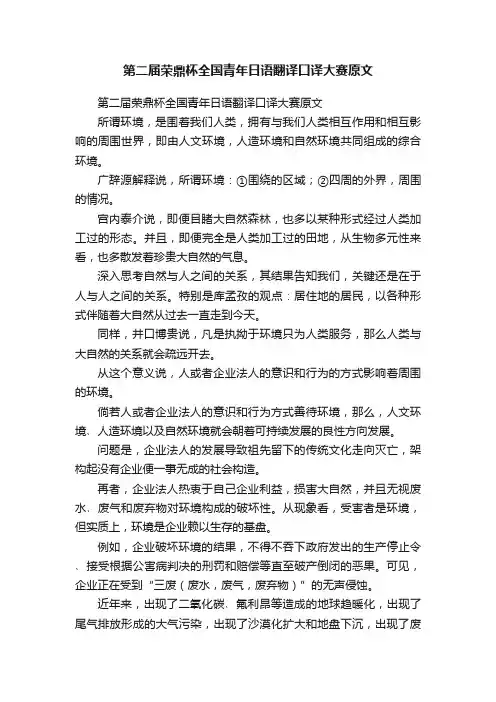
第二届荣鼎杯全国青年日语翻译口译大赛原文第二届荣鼎杯全国青年日语翻译口译大赛原文所谓环境,是围着我们人类,拥有与我们人类相互作用和相互影响的周围世界,即由人文环境,人造环境和自然环境共同组成的综合环境。
广辞源解释说,所谓环境:①围绕的区域;②四周的外界,周围的情况。
宫内泰介说,即便目睹大自然森林,也多以某种形式经过人类加工过的形态。
并且,即便完全是人类加工过的田地,从生物多元性来看,也多散发着珍贵大自然的气息。
深入思考自然与人之间的关系,其结果告知我们,关键还是在于人与人之间的关系。
特别是库孟孜的观点:居住地的居民,以各种形式伴随着大自然从过去一直走到今天。
同样,井口博贵说,凡是执拗于环境只为人类服务,那么人类与大自然的关系就会疏远开去。
从这个意义说,人或者企业法人的意识和行为的方式影响着周围的环境。
倘若人或者企业法人的意识和行为方式善待环境,那么,人文环境﹑人造环境以及自然环境就会朝着可持续发展的良性方向发展。
问题是,企业法人的发展导致祖先留下的传统文化走向灭亡,架构起没有企业便一事无成的社会构造。
再者,企业法人热衷于自己企业利益,损害大自然,并且无视废水﹑废气和废弃物对环境构成的破坏性。
从现象看,受害者是环境,但实质上,环境是企业赖以生存的基盘。
例如,企业破坏环境的结果,不得不吞下政府发出的生产停止令﹑接受根据公害病判决的刑罚和赔偿等直至破产倒闭的恶果。
可见,企业正在受到“三废(废水,废气,废弃物)”的无声侵蚀。
近年来,出现了二氧化碳﹑氟利昂等造成的地球趋暖化,出现了尾气排放形成的大气污染,出现了沙漠化扩大和地盘下沉,出现了废弃物的非法扔弃﹑填埋场污水和工厂废水带来的河水与海水严重污染,还出现了由焚烧造成的二次污染等不忍目睹的现象。
因此,研究如何改善上述动摇人类生存基盘的环境问题和制定对策则成了燃眉之急。
也许,应该从战略高度根本解决日益严峻的环境问题之角度出发,以环境法和环境道德为基准,例如,也许应该把构筑回收再生利用体系﹑构筑环境教育体系﹑构筑申领ISO认证体系作为最优先考虑的课题吧?!中国的上海城,被称之为国际大都市,也被称之为世界最大工厂集结地。
浅议法语中的日语外来词
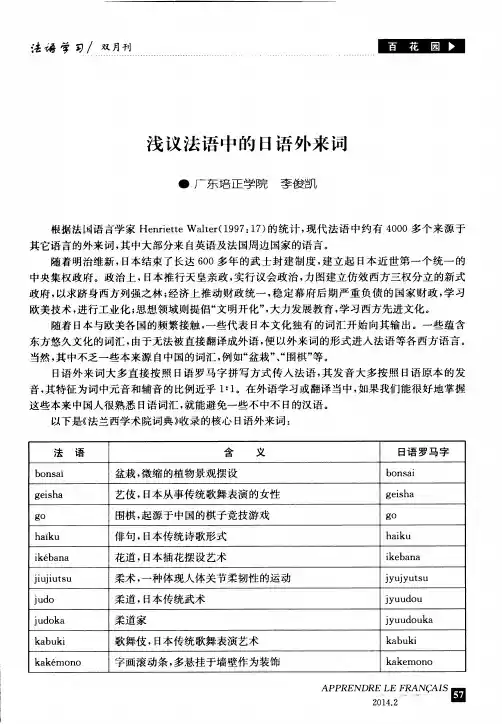
含义 幕 府 ,日本古时的将军职位 武 士 道 ,日本武士所遵循的精神 大 名 ,日本古代地方元首 卡 拉 01^ 和 服 ,日本传统民族服装 漫 画 ,专指现代日本流行漫画 明治 ,日本天皇年号(1868-1912) 折纸艺术 御 宅 族 ,指沉迷动漫长期在家不出门的人 刺 身 ,生鱼片 切 腹 ,日本武士视为保存尊严的自杀方式 神 道 ,日本传统宗教 新 干 线 ,日本高速火车技术 寿 司 ,日本传统食品 榻 榻 米 ,日本传统居室中供人坐卧的草席 天 妇 罗 ,油炸的食物 豆 腐 ,一种黄豆制的食物 鸟 居 ,日本神社门前的牌坊式建筑
主办
北京外国语大学
编辑
《法语学习》编辑部
地址 北 京 8936信 箱 2 9 分箱
电话
邮政编码
100089
电邮
9@ 13(311^ (11^ ⑶
出版
外语教学与研究出版社
地址 北京市西三环北路19号 发行部 (010) 88819867/69
印刷
北京联华印刷厂
编辑部编委会 主编王助 副主编 王吉会 编委王助 傅荣 王吉会 车琳 本期执行编辑 王吉会
日 语外来词大 多 直 接 按 照 日 语 罗 马 字 拼 写 方 式 传 入 法 语 ,其发音大多按照日语原本的发 音 ,其特征为词中元音和辅音的比例近乎1 :1 。在外语学习或翻译当中,如果我们能很好地掌握 这 些 本 来 中 国 人 很 熟 悉 日 语 词 汇 ,就 能 避 免 一 些 不 中 不 日 的 汉 语 。
厶
广^1^ 、看广、擎广、擎广、擎广、參广、擎广、费广、春广、费广、擎广、參广、参广、參广、费广、參广、卜、參广、會广、费广、參广、费广、争广、參广、參广、參广、春广、參广、參广、參广、參广、參广、费广、參产、參广
第十一届CASIO杯翻译竞赛原文(日语组)
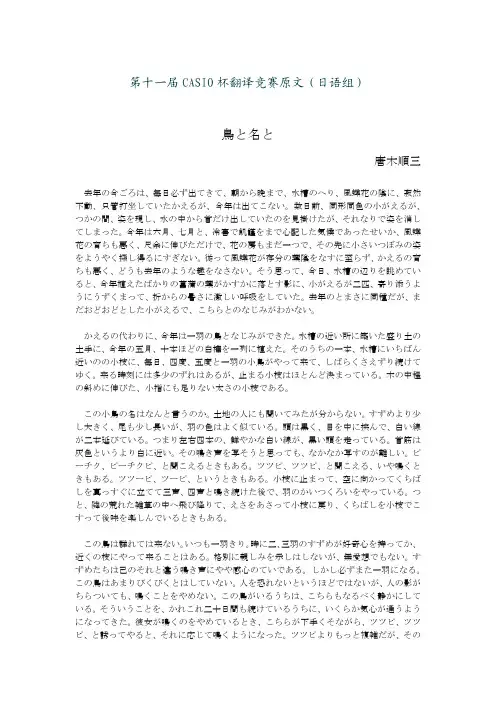
第十一届CASIO杯翻译竞赛原文(日语组)鳥と名と唐木順三去年の今ごろは、毎日必ず出てきて、朝から晩まで、水槽のへり、風蝶花の陰に、寂然不動、只管打坐していたかえるが、今年は出てこない。
数日前、同形同色の小がえるが、つかの間、姿を現し、水の中から首だけ出していたのを見掛けたが、それなりで姿を消してしまった。
今年は六月、七月と、冷害で飢饉をまで心配した気候であったせいか、風蝶花の育ちも悪く、尺余に伸びただけで、花の房もまだ一つで、その先に小さいつぼみの姿をようやく探し得るにすぎない。
従って風蝶花が存分の葉陰をなすに至らず、かえるの育ちも悪く、どうも去年のような趣をなさない。
そう思って、今日、水槽の辺りを眺めていると、今年植えたばかりの菖蒲の葉がかすかに落とす影に、小がえるが二匹、寄り添うようにうずくまって、折からの暑さに激しい呼吸をしていた。
去年のとまさに同種だが、まだおどおどとした小がえるで、こちらとのなじみがわかない。
かえるの代わりに、今年は一羽の鳥となじみができた。
水槽の近い所に築いた盛り土の土手に、今年の五月、十本ほどの白樺を一列に植えた。
そのうちの一本、水槽にいちばん近いのの小枝に、毎日、四度、五度と一羽の小鳥がやって来て、しばらくさえずり続けてゆく。
来る時刻には多少のずれはあるが、止まる小枝はほとんど決まっている。
木の中程の斜めに伸びた、小指にも足りない太さの小枝である。
この小鳥の名はなんと言うのか。
土地の人にも聞いてみたが分からない。
すずめより少し大きく、尾も少し長いが、羽の色はよく似ている。
頭は黒く、目を中に挟んで、白い線が二本延びている。
つまり左右四本の、鮮やかな白い線が、黒い頭を走っている。
首筋は灰色というより白に近い。
その鳴き声を写そうと思っても、なかなか写すのが難しい。
ピーチク、ピーチクピ、と聞こえるときもある。
ツツピ、ツツピ、と聞こえる、いや鳴くときもある。
ツツーピ、ツーピ、というときもある。
第十届CASIO杯翻译竞赛西语原文
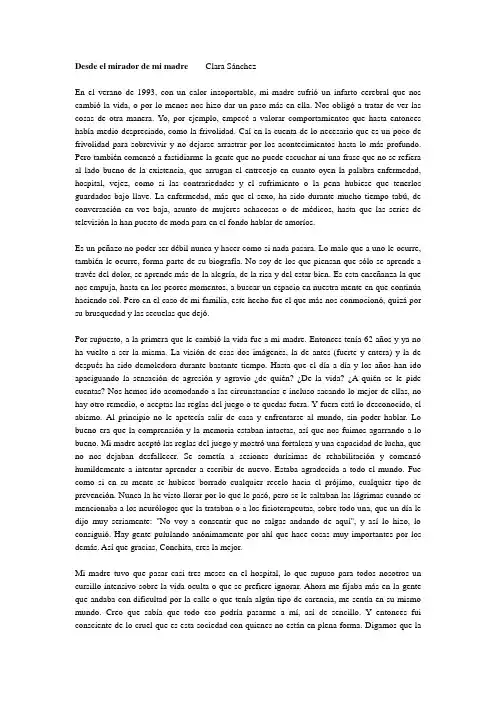
Desde el mirador de mi madre Clara SánchezEn el verano de 1993, con un calor insoportable, mi madre sufrióun infarto cerebral que nos cambió la vida, o por lo menos nos hizo dar un paso más en ella. Nos obligó a tratar de ver las cosas de otra manera. Yo, por ejemplo, empecéa valorar comportamientos que hasta entonces había medio despreciado, como la frivolidad. Caí en la cuenta de lo necesario que es un poco de frivolidad para sobrevivir y no dejarse arrastrar por los acontecimientos hasta lo más profundo. Pero también comenzó a fastidiarme la gente que no puede escuchar ni una frase que no se refiera al lado bueno de la existencia, que arrugan el entrecejo en cuanto oyen la palabra enfermedad, hospital, vejez, como si las contrariedades y el sufrimiento o la pena hubiese que tenerlos guardados bajo llave. La enfermedad, más que el sexo, ha sido durante mucho tiempo tabú, de conversación en voz baja, asunto de mujeres achacosas o de médicos, hasta que las series de televisión la han puesto de moda para en el fondo hablar de amoríos.Es un peñazo no poder ser débil nunca y hacer como si nada pasara. Lo malo que a uno le ocurre, también le ocurre, forma parte de su biografía. No soy de los que piensan que sólo se aprende a través del dolor, se aprende más de la alegría, de la risa y del estar bien. Es esta enseñanza la que nos empuja, hasta en los peores momentos, a buscar un espacio en nuestra mente en que continúa haciendo sol. Pero en el caso de mi familia, este hecho fue el que más nos conmocionó, quizá por su brusquedad y las secuelas que dejó.Por supuesto, a la primera que le cambió la vida fue a mi madre. Entonces tenía 62 años y ya no ha vuelto a ser la misma. La visión de esas dos imágenes, la de antes (fuerte y entera) y la de después ha sido demoledora durante bastante tiempo. Hasta que el día a día y los años han ido apaciguando la sensación de agresión y agravio ¿de quién? ¿De la vida? ¿A quién se le pide cuentas? Nos hemos ido acomodando a las circunstancias e incluso sacando lo mejor de ellas, no hay otro remedio, o aceptas las reglas del juego o te quedas fuera. Y fuera está lo desconocido, el abismo. Al principio no le apetecía salir de casa y enfrentarse al mundo, sin poder hablar. Lo bueno era que la comprensión y la memoria estaban intactas, así que nos fuimos agarrando a lo bueno. Mi madre aceptó las reglas del juego y mostró una fortaleza y una capacidad de lucha, que no nos dejaban desfallecer. Se sometía a sesiones durísimas de rehabilitación y comenzóhumildemente a intentar aprender a escribir de nuevo. Estaba agradecida a todo el mundo. Fue como si en su mente se hubiese borrado cualquier recelo hacia el prójimo, cualquier tipo de prevención. Nunca la he visto llorar por lo que le pasó, pero se le saltaban las lágrimas cuando se mencionaba a los neurólogos que la trataban o a los fisioterapeutas, sobre todo una, que un día le dijo muy seriamente: "No voy a consentir que no salgas andando de aquí", y asílo hizo, lo consiguió. Hay gente pululando anónimamente por ahí que hace cosas muy importantes por los demás. Así que gracias, Conchita, eres la mejor.Mi madre tuvo que pasar casi tres meses en el hospital, lo que supuso para todos nosotros un cursillo intensivo sobre la vida oculta o que se prefiere ignorar. Ahora me fijaba más en la gente que andaba con dificultad por la calle o que tenía algún tipo de carencia, me sentía en su mismo mundo. Creo que sabía que todo eso podría pasarme a mí, asíde sencillo. Y entonces fui consciente de lo cruel que es esta sociedad con quienes no están en plena forma. Digamos que laenfermedad de mi madre nos puso unas gafas de aumento para ver mejor lo que hay alrededor, eso sí, a un gran precio. Tras ella, el mayor sin duda lo ha pagado mi padre, que se ha hecho cargo de esta complicada situación para que a todos nos alterase lo menos posible. No es un hombre pacífico ni resignado, sino más bien rebelde e incisivo, y quizá por eso nunca se ha dejado abatir. Siempre busca recursos para estar activo y en conflicto, y no ha permitido jamás que mi madre dejase de discutir con él y decirle cuatro verdades, aunque fuese a su manera.Lo cierto es que tengo unos padres atípicos y bastante graciosos, muy discutones. Les da la vida montar el pollo durante los telediarios por algo que haya dicho fulano o mengano. Siempre ha habido tensiones políticas entre ellos. Mi padre lee EL PAÍS y Expansión y oye la SER e Intereconomía. Lleva un control férreo de los movimientos de la Bolsa. Cuando baja, está de un humor de perros. Yo, que no tengo inversiones, sé cómo va por el tono de su voz. Le gusta mucho la ropa y los complementos. Y no soporta que le llamen anciano. Lo de abuelo está absolutamente restringido a los nietos. Prefiere la definición de viejo. Dice que se dio cuenta de que era considerado viejo cuando los coches se atrevían a pasar el suyo nada más verle por detrás la nuca blanca. Y no sé cómo se las arregla para hacer un seguimiento tan exhaustivo del mundo literario. Aunque no quiera enterarme, me tiene al tanto de los logros, premios y colaboraciones de todos los colegas, para a continuación añadir, tienes que espabilar. Por eso a mis padres no les importa que escriba sobre ellos, con tal de proporcionarme material y ayudarme a salir adelante.No era fácil durante y tras lo que se podría llamar el largo verano del 93 centrarme en otra cosa. Trataba de distraerme para no hablar ni pensar en ello. Hasta que decidí que no debía olvidar, sino todo lo contrario, aprovecharlo en mi propia experiencia, no desecharlo puesto que tanto esfuerzo nos suponía a todos. Así que tiempo más tarde, cuando ya tenía la cabeza algo más fría, empecé a escribir y salió una novela, Desde el mirador (Alfaguara, 1996), que empieza así:"La tarde va quedando atrás. Un cable negro cruza el cielo azul. La ventanilla de un vagón de tren limita y recorta el campo. Sobre el cable, y por un instante, unos grandes pájaros en fila también quedan atrás. La sierra, a lo lejos, y más cerca los árboles y las fábricas se perfilan en el aire como montañas, árboles y fábricas presentes y reales.He viajado a través de este paisaje durante dos meses y desde entonces el sol se ha ido debilitando poco a poco y también la angustia inicial que me hizo dudar de que la vida fuera buena, a pesar de que es lo único que hay. Ahora me queda cierta flaqueza por aquella duda, cierta zozobra constante y la certeza de que cuando se conoce algo ya no se puede desconocer, no tan sólo olvidar, sino que es imposible volver al origen en que no se sabía aquello.He recorrido los 60 kilómetros que unen el Hospital General con Madrid, cada dos días más o menos, hasta ésta misma tarde en que le han dado el alta a mi madre. La última imagen que he retenido de ella ha sido su blusa de seda azul alejándose en el coche, regresando al mundo, mezclándose con el aire que rodea el hospital y con el que se extiende donde se le pierde de vista y mucho más allá aún. Ya es libre, menos que un pájaro porque no puede volar y menos que un pez porque no puede respirar bajo el agua, pero más que un pájaro y un pez porque piensa. Ella me ha hecho creer que nadie puede ser libre nada más que a su manera.Recuerdo sin desesperación y con pesar, como si me hubiera distraído y no hubiese hecho algo que debía, el día de finales de junio, cuando sonó el teléfono en mi casa, en las afueras de Madrid. Una voz desde un hospital me comunicó que mi madre había sufrido un derrame cerebral. Luego se confirmóque había sido infarto. Me cuesta mucho pronunciar infarto cerebral y mucho más escribirlo, es como tratar de escribir en el papel con un hierro al rojo vivo".。
第十届CASIO杯翻译竞赛英语组原文及获奖翻译
第十届CASIO杯翻译竞赛英语组原文Humans are animals and like all animals we leave tracks as we walk:signs of passage made in snow,sand,mud,grass,dew,earth or moss.The language of hunting has a luminous word for such mark-making:‘foil’.A creature’s‘foil’is its track.We easily forget that we are track-makers,though,because most of our journeys now occur on asphalt and concrete–and these are substances not easily impressed.Always,everywhere,people have walked,veining the earth with paths visible and invisible,symmetrical or meandering,’writes Thomas Clark in his enduring prose-poem‘In Praise of Walking’.It’s true that,once you begin to notice them,you see that the landscape is still webbed with paths and footways–shadowing the modern-day road network,or meeting it at a slant or perpendicular.Pilgrim paths, green roads,drove roads,corpse roads,trods,leys,dykes,drongs,sarns,snickets–say the names of paths out loud and at speed and they become a poem or rite–holloways,bostles,shutes,driftways,lichways,ridings,halterpaths,cartways,carneys, causeways,herepaths.Many regions still have their old ways,connecting place to place,leading over passes or round mountains,to church or chapel,river or sea.Not all of their histories are happy.In Ireland there are hundreds of miles of famine roads,built by the starving during the1840s to connect nothing with nothing in return for little,unregistered on Ordnance Survey base maps.In the Netherlands there are doodwegen and spookwegen–death roads and ghost roads–which converge on medieval cemeteries. Spain has not only a vast and operational network of cañada,or drove roads,but also thousands of miles of the Camino de Santiago,the pilgrim routes that lead to the shrine of Santiago de Compostela.For pilgrims walking the Camino,every footfall is doubled,landing at once on the actual road and also on the path of faith.In Scotland there are clachan and rathad–cairned paths and shieling paths–and in Japan the slender farm tracks that the poet Bashōfollowed in1689when writing his Narrow Road to the Far North.The American prairies were traversed in the nineteenthcentury by broad‘bison roads’,made by herds of buffalo moving several beasts abreast,and then used by early settlers as they pushed westwards across the Great Plains.Paths of long usage exist on water as well as on land.The oceans are seamed with seaways–routes whose course is determined by prevailing winds and currents–and rivers are among the oldest ways of all.During the winter months,the only route in and out of the remote valley of Zanskar in the Indian Himalayas is along the ice-path formed by a frozen river.The river passes down through steep-sided valleys of shaley rock,on whose slopes snow leopards hunt.In its deeper pools,the ice is blue and lucid.The journey down the river is called the chadar,and parties undertaking the chadar are led by experienced walkers known as‘ice-pilots’,who can tell where the dangers lie.Different paths have different characteristics,depending on geology and purpose. Certain coffin paths in Cumbria have flat‘resting stones’on the uphill side,on which the bearers could place their load,shake out tired arms and roll stiff shoulders;certain coffin paths in the west of Ireland have recessed resting stones,in the alcoves of which each mourner would place a pebble.The prehistoric trackways of the English Downs can still be traced because on their close chalky soil,hard-packed by centuries of trampling,daisies flourish.Thousands of work paths crease the moorland of the Isle of Lewis in the Outer Hebrides,so that when seen from the air the moor has the appearance of chamois leather.I think also of the zigzag flexure of mountain paths in the Scottish Highlands,the flagged and bridged packhorse routes of Yorkshire and Mid Wales,and the sunken green-sand paths of Hampshire on whose shady banks ferns emerge in spring,curled like crosiers.The way-marking of old paths is an esoteric lore of its own,involving cairns, grey wethers,sarsens,hoarstones,longstones,milestones,cromlechs and other guide-signs.On boggy areas of Dartmoor,fragments of white china clay were placed to show safe paths at twilight,like Hansel and Gretel’s pebble trail.In mountain country,boulders often indicate fording points over rivers:Utsi’s Stone in the Cairngorms,for instance,which marks where the Allt Mor burn can be crossed toreach traditional grazing grounds,and onto which has been deftly incised the petroglyph of a reindeer that,when evening sunlight plays over the rock,seems to leap to life.Paths and their markers have long worked on me like lures:drawing my sight up and on and over.The eye is enticed by a path,and the mind’s eye also.The imagination cannot help but pursue a line in the land–onwards in space,but also backwards in time to the histories of a route and its previous followers.As I walk paths I often wonder about their origins,the impulses that have led to their creation, the records they yield of customary journeys,and the secrets they keep of adventures, meetings and departures.I would guess I have walked perhaps7,000or8,000miles on footpaths so far in my life:more than most,perhaps,but not nearly so many as others.Thomas De Quincey estimated Wordsworth to have walked a total of 175,000–180,000miles:Wordsworth’s notoriously knobbly legs,‘pointedly condemned’–in De Quincey’s catty phrase–‘by all…female connoisseurs’,were magnificent shanks when it came to passage and bearing.I’ve covered thousands of foot-miles in my memory,because when–as most nights–I find myself insomniac,I send my mind out to re-walk paths I’ve followed,and in this way can sometimes pace myself into sleep.‘They give me joy as I proceed,’wrote John Clare of field paths,simply.Me too.‘My left hand hooks you round the waist,’declared Walt Whitman–companionably, erotically,coercively–in Leaves of Grass(1855),‘my right hand points to landscapes of continents,and a plain public road.’Footpaths are mundane in the best sense of that word:‘worldly’,open to all.As rights of way determined and sustained by use,they constitute a labyrinth of liberty,a slender network of common land that still threads through our aggressively privatized world of barbed wire and gates,CCTV cameras and‘No Trespassing’signs.It is one of the significant differences between land use in Britain and in America that this labyrinth should exist.Americans have long envied the British system of footpaths and the freedoms it offers,as I in turn envy the Scandinavian customary right of Allemansrätten(‘Everyman’s right’).This convention–born of a region that did not pass through centuries of feudalism,andtherefore has no inherited deference to a landowning class–allows a citizen to walk anywhere on uncultivated land provided that he or she cause no harm;to light fires;to sleep anywhere beyond the curtilage of a dwelling;to gather flowers,nuts and berries; and to swim in any watercourse(rights to which the newly enlightened access laws of Scotland increasingly approximate).Paths are the habits of a landscape.They are acts of consensual making.It’s hard to create a footpath on your own.The artist Richard Long did it once,treading a dead-straight line into desert sand by turning and turning about dozens of times.But this was a footmark not a footpath:it led nowhere except to its own end,and by walking it Long became a tiger pacing its cage or a swimmer doing lengths.With no promise of extension,his line was to a path what a snapped twig is to a tree.Paths connect.This is their first duty and their chief reason for being.They relate places in a literal sense,and by extension they relate people.Paths are consensual,too,because without common care and common practice they disappear:overgrown by vegetation,ploughed up or built over(though they may persist in the memorious substance of land law).Like sea channels that require regular dredging to stay open,paths need walking.In nineteenth-century Suffolk small sickles called‘hooks’were hung on stiles and posts at the start of certain wellused paths: those running between villages,for instance,or byways to parish churches.A walker would pick up a hook and use it to lop off branches that were starting to impede passage.The hook would then be left at the other end of the path,for a walker coming in the opposite direction.In this manner the path was collectively maintained for general use.By no means all interesting paths are old paths.In every town and city today, cutting across parks and waste ground,you’ll see unofficial paths created by walkers who have abandoned the pavements and roads to take short cuts and make asides. Town planners call these improvised routes‘desire lines’or‘desire paths’.In Detroit –where areas of the city are overgrown by vegetation,where tens of thousands of homes have been abandoned,and where few can now afford cars–walkers and cyclists have created thousands of such elective easements.第十届CASIO杯翻译竞赛英语组参考译文路[英]罗伯特·麦克法伦作侯凌玮译人是一种动物,因而和所有其他动物一样,我们行走时总会留下踪迹:雪地、沙滩、淤泥、草地、露水、土壤和苔藓上都有我们经过的痕迹。
CASIO英语翻译比赛翻译作品
作家们怎样打造品牌托尼·佩罗蒂提所有作家都清楚,如今写本书并不是什么难事了。
直到出版日期临近了,我们才不得不挽挽袖子开始真正的文学工作:狂热的自我推销。
在这之前的几周里,我们被逼得用有新意的电子邮件和脸谱网消息提醒对所有亲朋好友和认识的人进行宣传。
我们装饰自己的网站,改换年轻得让人生疑的照片,没完没了的写博客,发布推特状态,上传视频宣传片,企图把包括自己的阅读、签名、评论、谈话记录,还有电视演出(至少我们可以幻想得出)在内的一切通通告诉给一个已经被淹没了的世界。
在这个作家除了开印刷厂之外什么都可能做得出来的时代,自我推销已经太平常不过了,以至于我们几乎不用想。
然而,每次我有新书要出版,我就不得不驱除这种恼人的感觉,总觉得自己吸引公众注意力的做法不大体面。
因为有文学的高要求,像伟哥促销员一样挨户兜售自己的作品的做法仍然让我觉得奇怪。
每当产生这种疑惑时,我就回顾历史以求恢复信心。
令人欣慰的是很多伟大的作家曾使用过文学卖淫—我指的是自我推销—这种手段。
最受尊崇的法国作家巴尔扎克认识到公关的必要性。
“对艺术家而言,要解决的最大的问题是怎样让自己受到人们的关注”巴尔扎克在描写19世纪早期巴黎文学生活的《幻灭》中说道。
另一位大师司汤达在他的自传《一个利己主义者的回忆录》中评论说;“没有一定程度的厚脸皮,甚至江湖手段,想要取得大的成功是不可能的。
”这些话确实应该刻在作家协会的盾徽上。
海明威为创造性的自我宣传做出了极好的表率。
他的形象因在探险旅行、垂钓旅行和战区的照片造型而显得愈加光辉。
但他也为啤酒广告摆过造型。
1951年,美国《生活》杂志以两张版面登出了海明威签名的百龄坛麦芽威士忌广告,快照画面中的海明威在他的哈瓦那寓所中看起来很阳刚。
在马修·布鲁克林和朱蒂斯·鲍曼编辑的《海明威和声誉机制》中详细地记述了海明威骄傲地出现在为泛美航空公司和派克钢笔公司做的广告中。
他极其热情地把自己的名字卖给了今天的詹妮弗·洛佩斯或勒布朗·詹姆斯。
第二届“卡西欧—VIEW杯”英语情景模拟大赛策划 正式稿
第二届“卡西欧—VIEW杯”英语情景模拟大赛赞助策划2009年10月目录一、关于我们‥‥‥‥‥‥‥‥‥‥‥31、关于浙江工商大学2、关于英语协会二、活动策划‥‥‥‥‥‥‥‥‥‥‥ 51、活动意义2、活动前期准备3、活动流程详介4、奖项设置5、报名表及评分表浙江工商大学英语协会6、后期宣传三、宣传方式‥‥‥‥‥‥‥‥‥‥‥ 71、传单宣传2、横幅宣传3、海报宣传四、活动时间安排‥‥‥‥‥‥‥‥‥ 8五、活动经费预算‥‥‥‥‥‥‥‥‥ 9六、赞助回馈方式‥‥‥‥‥‥‥‥‥ 10附录1:第二届“卡西欧—VIEW杯”英语情景模拟大赛报名表附录2:第二届“卡西欧—VIEW杯”英语情景模拟大赛初赛评分表附录3:第二届“卡西欧—VIEW杯”英语情景模拟大赛决赛评分表一.关于我们1.关于浙江工商大学浙江工商大学是一所拥有管理学、经济学、工学、文学、法学、理学的多科性大学。
她的前身是1911年创建的杭州中等商业学堂,是近代中国最早培养商业专门人才的学校之一。
章乃器、骆耕漠等是杭州商学院的著名校友。
1980年经国务院批准成立杭州商学院。
1998年,学校由国内贸易部部属院校转为中央与地方共建、以地方管理为主的办学管理体制。
2004年,经教育部批准更名为浙江工商大学。
学校现有教工路校区和下沙校区两个校区,总占地面积2060亩,建筑面积68万平方米。
学校设有十六院二部一中心,拥有研究生、全日制普通本科在校生15000人,学生规模居浙江省高校第五位,在杭高校第三位。
学校设有6个学科,4个省级重点学科,2个省级重点扶植学科,30余个研究机构,拥有3个博士学科点、20个硕士学科点。
2.关于英语协会浙江工商大学英语协会是一个以马列主义、毛泽东思想、邓小平理论、江泽民三个代表为指导思想,以活跃校园英语学习气氛,提高学生英语学习兴趣与能力为宗旨,由浙江工商大学团委、外国语学院团委指导、校社团联合会管理的面向全校的学术性社团。
自1998年成立以来,理事会凭着“牢记宗旨,双向把握;求实定位,锐意进取”的发展思路,通过参与式的柔性管理,领导四个部门(办公室、宣传部、组织部、学术部)常年开展各式各样的英语相关浙江工商大学英语协会特色活动,不断发挥潜力,创新求进,吸引了众多英语爱好者。
06日语翻译示范文本
漂亮 埃斯帕达斯
怎...怎么可能
防下了翼的绝招倒钩射门...
挺能干的嘛 埃斯帕达斯
但是 确实这个近距离的射门也是没法接住 球弹了出来
啊
什
!!
15
啊 然后两个身影队这个弹出来的球做出了快速反应!!
这...这是...
16
前锋日向和若岛津~~~~
翼和岬能做到 我们也行!!
17
咿呀~~~~~~~~~!!
这是吉良教练长年的梦想 原明和FC日向和若岛津两个人的双箭头合作...凌空抽射
双人射门~~~~~~~
小次郎 若岛津
日向前辈
若岛津前辈 18 Nhomakorabea去...
看到了
我的得意弟子...小次郎!!若岛津!!
19
吧!!
两个人强力的摇晃球向着墨西哥球门袭去
10
在这个瞬间 这场比赛最大的欢呼声在这个容纳十万人的墨西哥阿兹特克球场中回响
翼
翼
翼前辈
传家的宝刀 翼的倒钩射门~~~~~
12
哇 埃斯帕达斯挺身而出!!
门将飞身到了这个位置
13
看出来了!传奇门将埃斯帕达斯看出来翼的这个带球突破后的倒钩射门~~~~~
14
呃
可恶
05
击垮他!!
但是 对翼来说“足球是朋友” 不会让给任何人~~~~~~
翼!!
好 上啊 翼!!
翼前辈
06
翼的“南美式带球突破”这里也是抢不下来的!!击溃不了的!!
...那么 我来防下他!!
马纳迪斯
07
怎...怎么会
巧妙的一口气晃过了两个中后卫的防守 进入墨西哥的禁区~~~~~
- 1、下载文档前请自行甄别文档内容的完整性,平台不提供额外的编辑、内容补充、找答案等附加服务。
- 2、"仅部分预览"的文档,不可在线预览部分如存在完整性等问题,可反馈申请退款(可完整预览的文档不适用该条件!)。
- 3、如文档侵犯您的权益,请联系客服反馈,我们会尽快为您处理(人工客服工作时间:9:00-18:30)。
年底这么忙,何苦偷人家的车
十二月五日。
说起来话长,总之我的车给偷了。
早上起来一看,我那本应停在门前的“大众·科拉德”不见了,一辆白色“本田·雅阁”停在那里。
无论怎么想都只能认为是被盗,总不至于我睡觉的时间里汽车自行其是地跑去哪里了。
得得,这可糟了,我叹口气想。
毕竟两个星期前我的宝贝自行车刚刚在哈佛广场给人偷走。
用铁链绑在行道树的树干上来着,十五分钟后买完东西回来一看,自行车消失得无影无踪,惟独铁链剩下。
此前大学体育馆的贮物柜被人撬开,丢了打壁球用的运动鞋。
要是连汽车也给偷了,那可真让人吃不消了。
简直倒霉透顶。
三十分钟后一位年轻的高个子女警察到我家来了。
比我高出半个脑袋,一头金发,长得酷似劳拉·邓恩(注:美国女电影演员。
主演有《一个完美的世界》等。
)。
她的工作是填写被盗报告书。
把车号、年代型号、颜色等必要事项轻描淡写地记在专用纸上,递过一张复写件,道一声“再联系”就往回走。
一看就知这工作没多大刺激性,她本人也没表现出多少乐此不疲的样子。
若是警匪片,年轻美丽的女警官势必同克林特·依斯特伍德或梅尔·吉布森(注:美国电影演员、导演。
1956年生于纽约,1968年移居澳大利亚,1995年获奥斯卡最佳导演奖。
)搭档度过波澜万丈的人生,而现实中不可能那样。
现实是更为现实性的。
我问她“这一带经常丢车?”“哪里,没那回事,这附近很少听说丢车。
说实话,我也有点吃惊。
”她以一点也不吃惊的神情说,然后冷冰冰地道声“再见”,独自乘上警车扬长而去。
“这附近很少听说丢车”倒是真的,我提起这事,房东史蒂夫也大为惊讶:“怪了!这里不该发生那种事啊,奇怪!”往下就语塞了。
住在前面一条街的另一个史蒂夫(他是搞电影的)也大为惊奇:“这种事简直无法置信。
我在这里住了二十来年,从没听说谁家停的车给人偷走了。
这实在是惊人的事情。
”我住的地方虽说不是什么富人区,却也是像富人区那种与犯罪无缘的幽静平和的地方。
正因为这样,我停车才只上门锁,而没锁方向盘。
但是信也好不信也好,有先例也好没先例也好,惊奇也好同情也好,反正我丢车这一事实是无法消失的了。
报警之后我必须做的下一件事是跟保险代理公司联系。
但是,这家代理公司给我的感觉却是“哦?车丢了(※真是麻烦!)?那你打算……?”至于友好表示和同情心那些玩意儿连一星半点都没有。
对方接过警察报告书的影印件扫了一眼,说了声“那好,跟保险公司联系”就算完事了(从我几次个人经历来说,汽车保险代理公司乃是美国可供人度过最不愉快时间的场所之一。
所有的人都以一副不胜其烦的神情工作着,这同美国梦(注:指美国人希望以自己的能力、在机会均等的前提下追求富裕、自由与成功等的梦想。
)的破灭也许有某种关系)。
但不管怎样,车找回之前每天最高十五美元的租车费是由保险补贴的,这个我晓得。
这还算好。
我求熟人杰伊开车把我带到租车公司,租了一辆一天二十一美元的“福特·雅仕”(啧啧,有安全气囊,却没有副驾驶席的后视镜)。
租车窗口的男子安慰说:“被盗车有百分之九十可能在三四天内找到。
就是那帮所谓‘偷车兜风’的家伙,这些小子开着兜一阵子见汽油没了就扔掉。
等一等肯定找到的。
”
十二月八日。
不出其所料,车四天后找到了:扔在波士顿郊外一个叫埃文的镇上。
当地警察
用电脑核对车号,确认车主是剑桥市费易艾特街汽车被盗的村上氏。
打电话通知我的是剑桥警察署的警官。
“呃——车看上去没有……哎,没有受什么损害。
”那个警官兴味索然地说。
“那就好。
”我说。
那还算好。
“那么,警察先生,我这就去那个埃文镇拿车,可以吗?”
“哦……没那么简单,村香先生。
呃,对了,其实轮胎一个都没有了。
”警官像是在抠鼻孔,然后又突然想起什么似的补充了一句。
“还有,唔——,车轮也一个都没有了。
引擎根本启动不了。
所以,去也拿不回来的。
”
那到底啥地方没受什么损害?而且我不是村香是村上,我在心里想道。
不过说这个也无济于事,于是我乖乖道谢,有气无力地放下电话,然后跟常去修车的那家名叫“都市巧生活”(注:原文为streetwise,意为“具有在都市环境中巧妙生活能力的”。
)的汽车修理厂的鲍比(长相很像晚年——不,最近——的布赖恩·威尔逊(注:美国通俗音乐歌手,1942年出生于加利福尼亚。
))联系,请他安排拖车把车从埃文运到他那里。
十二月九日。
繁琐的手续没完没了(内容没多大意思,对美国汽车保险的内情没兴趣的人请跳过这段往下看)。
先去警察署请他们开具Recovery Report(发现证明书)。
这个警察署又是个相当卡夫卡式的忧郁场所,写起来没完,这里不细说了。
接下去径直赶到代理公司,提交Recovery Report。
代理公司把Recovery Report用传真转给保险公司,保险公司派专业鉴定人员来“都市巧生活” 汽车修理厂检查我的车况,开具保险金核定通知书,此后汽车才能开始修理。
不,这还不算完。
按规定保险公司的工作人员要对我进行三十分钟的电话问询。
这是附带宣誓的录音问询,我的回答全部具有法律效力。
负责问询的女性绝对算不上冷淡,但感冒极其严重,又是打喷嚏又是咳嗽,外加鼻音,发声几乎不能听懂。
这个又让我活活下了一次地狱。
我的小说正处在最后定稿的紧张关头,本来就已经忙得焦头烂额了……
然而,到时间过去了两个星期的现在,事态还是毫无进展。
我的可怜的“大众·科拉德”依然四肢残缺地趴在修理厂。
该由代理公司用传真发给保险公司的Recovery Report不知在什么地方忽然不翼而飞了。
而保险公司人员不来检查汽车进行估算,修理厂想修也不敢下手。
更有甚者,那个眉头紧锁爱理不理的代理公司女士向我冷冷地宣布:“寸上先生,以车找到之日为限,租车费不再补贴,以后自己负责!”我抗议说:“可一个车轮都没有的嘛!再说都是因为你弄丢了Recovery Report,修也修不了!”况且我不是寸上是村上。
可是抗议没被理睬,所以我一直自付租车费。
但问题是我也不晓得丢一辆车会带来如此不胜其烦的结果。
必须时不时给保险公司打电话,必须跑警察署和修理厂,必须找政府部门和学校总务科更换停车许可证,我被来回折腾,或吃闭门羹或遭人白眼,时间白白流失,神经越来越累。
毕竟身在外国,要讲外国话,想发脾气也发不好,这点尤其难受。
我虽然想摆出一副“噢,原来人世间这么麻烦吗?吃一堑长一智啊”的处变不惊的架势来,但实际上怎么也做不到这样子。
无谓的消耗!给一个朋友打电话问日本如何,朋友笑话我说“在日本不至于丢车的”。
不过用钉子划车门、给车胎放炮那样的恶作剧可是不少。
半斤八两,大家彼此小心为好。
本文出自林少华译《漩涡猫的找法》,有少量技术性改动。
